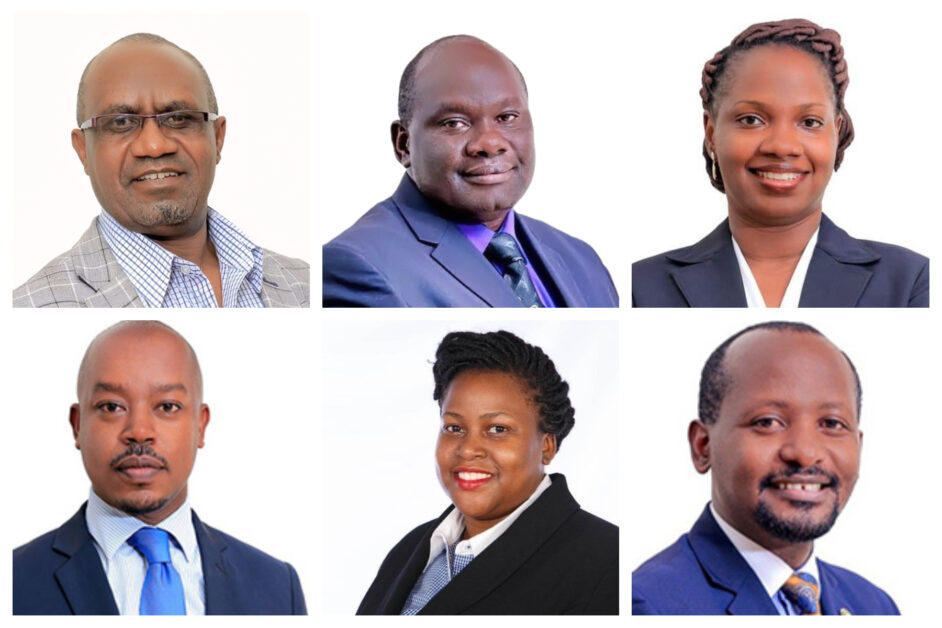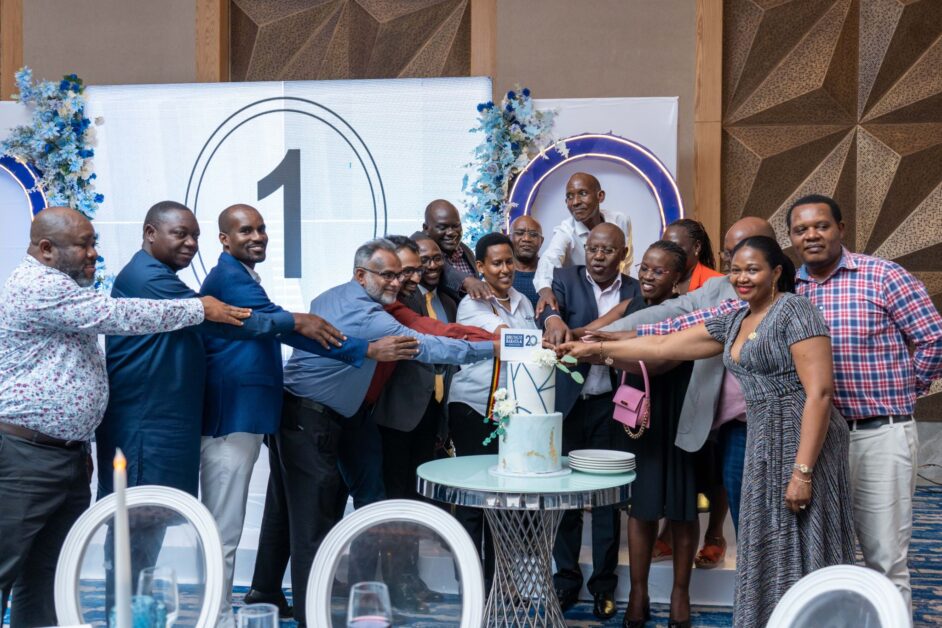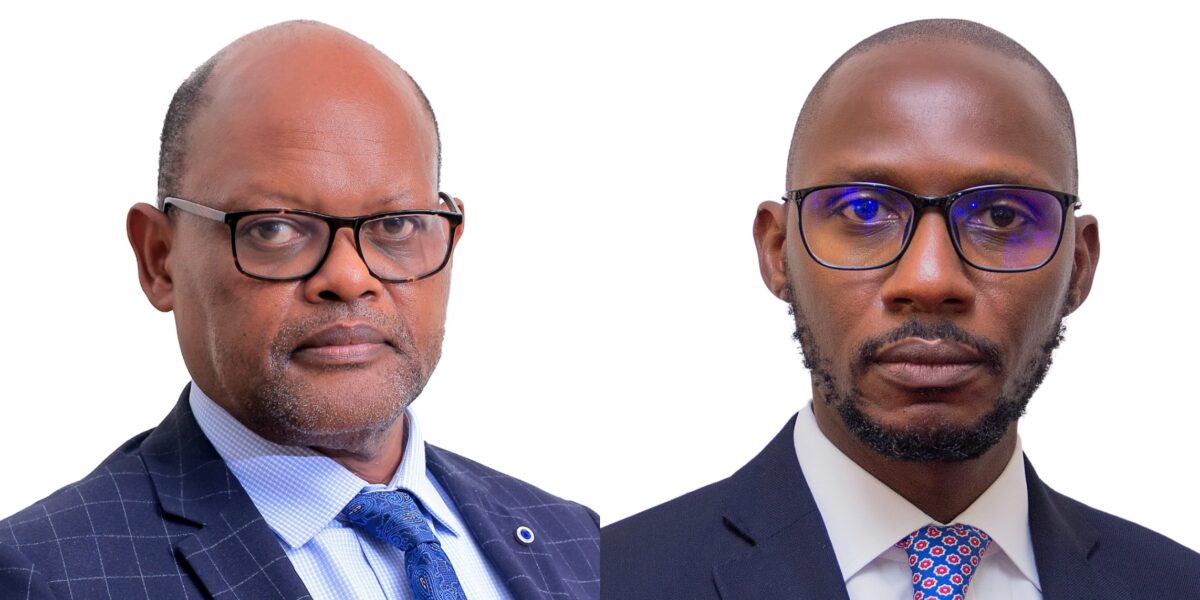20 years later, the firm has blossomed into one of Uganda’s most respected tax law firms, commanding more than 50% of all tax litigation in the country. The firm has also been recognised by rating agencies and peers⏤ domestically by the Uganda Law Society; regionally by the East Africa Law Society, and internationally by the IFLR1000, Chambers and Partners, the Global Law Experts and the ITR World Tax⏤ a comprehensive guide to the world’s leading tax firms.
Birungyi, Barata & Associates was also named by CEO East Africa Magazine in its 2023 List of Top 25 Corporate and Commercial Law Firms while the firm’s founding partners Enoch Barata and Birungyi Cephas were named in CEO East Africa Magazine’s Legal75⏤ A Guide To Uganda’s Top 75 Corporate And Commercial Lawyers for 2023.
CEO East Africa’s Executive Editor, Muhereza Kyamutetera, caught up with the two cofounders for insights on building successful and lasting partnerships, the changing trends in the legal landscape and how that is shaping the future.
My first question is to you, Enoch. How did you and Cephas meet and then agree to do business together, seeing that you are a little younger than him? And what were your early days like?
Enoch Barata: My earliest memory of meeting Cephas was somewhere around 1990. Of course, I was much younger then, and I think he had also started working. I was sent by my mother to drop something at URA for onward transmission and I think it is Cephas who received it. Then we again met in 2001 at the Law Development Centre, while doing our bar course. We reunited, so to speak.
When we finished our bar course, I went to work for what was then the Central Law Offices under Apollo Makubuya for a while. Cephas was still at URA and by this time he had grown to become an Assistant Commissioner, Domestic Taxes. It was during that time of my first year of work that we had a discussion, and there was a suggestion that we form a law firm. I and Cephas formally met over lunch, and had a chat, and very quickly agreed that we could do this and it was a good thing to do and went ahead to set up the firm.
Of course, having been much younger, it also meant that I had much fewer resources, so Cephas put up the first capital, and we agreed to look around for office space. I looked around, we then checked out a few places together and ended up at the Baumann House on Parliament Avenue, which is now occupied by the Attorney General’s Chambers. When we started, we had essentially one member of staff, a young lady called Husna, who was our secretary. We had a 50 square metre space and we divided it into two parts, Husna on one part as secretary, which also had our waiting area and then we sat on the other side, the two of us in a shared space. Although our office was small, it complied with all regulatory requirements, unlike several other firms, some of which had existed for a while. I remember in those days, there would be some firms, which were struggling during the inspections. But by the grace of God, we managed to set up.
At the very beginning, we decided that we were going to offer a specific service and offer it at the highest level, with the highest standard⏤ we decided we were going to do tax advisory and tax litigation. We grew over time moving from Baumman to Crusader House where we got bigger space. At that point, we had had a few conversations and had been joined by three senior tax consulting associates. These included George Twinomujuni, Fred Muganga, he is a retired tax person as well as our dearly departed, Robina Lutaaya. we then moved to Crusader House got some bigger space. From Crusader House, we then moved, I think in about 2014, to Plot 14 Archer Road and we have since grown bigger- we have two associates and four other partners and we think we will continue to grow because our aim is continuous growth and excellence in the tax practice are.

Let’s talk about partnerships. It’s been said that partnerships are hard to build in Uganda. How have you kept your partnership running for 20 years now? What lessons have you picked?
Birungyi Cephas: Partnerships are one of the two ways in which lawyers do business. The other, being sole proprietorship. There is no room for legal business and companies. And partnership is the preferred way when you’re growing because as a sole proprietor, there is only so much you can do. Partnerships aspire to provide the best service by using resources from more than one individual and being available most of the time to businesses. Partnerships are the common way in which businesses can grow.
The partnership business model is not very developed in this country, compared to several other more developed countries, because you find that the longest surviving partnerships are still run by the founders. Even the most successful partnerships here do not comprise more than 50 individuals, compared to some countries, you will find that some law firms have more than 1000 partners operating in very many different locations and jurisdictions. Here in Uganda, you find that even the most successful law firm is in one location. But it says a lot about the nature of the economy, rather than the capacity of the lawyers. There is only so much you can do within a limited economy.
The trend here is that when people complete their education and are qualified to practice as advocates, they have to choose whether to go and work in established firms or start on their own. But either way, in most cases they find that the structures are quite loose. So to make a partner from someone who started as a junior employee is not a very common occurrence. Most people will within the first six or eight years decide to move on from being employees to founding their own firms. That’s why you find that there is a proliferation of law firms made up of one or two, or three people. Even when those 2, 3 or 5, will within a short time most likely split to form another one or two firms. Yes, moving on happens all over the world in all kinds of businesses, but in Uganda, you have the kind of moving on, where the whole firm actually ceases to exist.
But that is symptomatic of the kind of economy we have and also the level of sophistication of the legal practice we have here. Many of the firms, which are doing well all over the world, you will find that they are engaged with a lot of big businesses which retain them, and are therefore able to meet their overheads and plan long term and have very clear structures of payment, succession and career improvement, which is not very prevalent here.
So here partnerships survive because the partners understand each other share the same long-term goals and can share revenue in a manner which is agreeable to them. Many times you find that partnerships break up because when revenue comes in, especially the kind of revenue, which has not been the norm- something a bit more than the year they’re used to, people then start quarrelling about the money and the next thing, the partnership breaks up. Of course, also, when partners look at the money for today and not the long term; they look at it for the short term, then again, that makes it difficult to keep working together because some individuals will have immediate problems and others don’t, so if they don’t have a shared vision, then that makes partnerships to break up quickly.
I think partnerships can only grow as much as the partners who make the partnerships and if the partners are ready to work as a partnership, to respect each other, recognise the strength of the different individuals and to have a united goal⏤ then the partnership will grow. One of the main causes of a partnerships’ lack of growth is the fact that partners have divergent views of how to grow, and how to share the revenue. Many partnerships break up in the first 10 years because each of the individuals who make up the partnership has different aspirations. This causes the breakups.

So all in all, partnerships work best where the partners have a shared vision and that vision cascades to the rest of the staff and other potential partners. A shared vision is the glue that most times binds lasting partnerships together. The most enduring partnerships will obviously be those where partners have respected each other’s different aspirations, and strengths and tolerated and recognised that there is a need for synergy.
Enoch Barata: One of the biggest lessons I have learnt on partnership is to go slow and go with others if you want to go far. That has been one of the major lessons and I think one of the bedrock of our partnership and the relationships that we have built over time. The other lesson is being able to recognise the strengths of each other and weaknesses of each other and therefore be able to plan and appropriate those so that you do not have a one-size-fits-all approach to partnerships, because if you adopt a one-size-fits-all mindset, you will find that your incompatibilities will be more pronounced than your abilities to work together.
From where you sit, how has the legal landscape changed over the last two decades and how is this likely to shape the future?
Enoch Barata: The legal landscape has undergone several changes over the last 20 years. There have been several changes in the landscape and the legal practice. Some of the people joining now may not believe what it was like 20 years ago. For example, the judiciary has expanded quite a bit over the years. When I started practice, we still had one centralised High Court. Just when I was getting in, we had the Commercial Division of the High Court created. Subsequently, there have been other specialised courts such as the Land Division, Civil Division, Criminal Division and so on. That also means that there has been an expansion in the number of judges that we have to attend to these matters. Similarly, there has been quite a huge increase in the number of magistrates. So, in a sense, justice is now more reachable; there is more access to Courts of Judicature.
Then, of course, the number of law firms has increased. Due to the expansion of the economy, lawyers also now have other opportunities elsewhere outside court practice. That is another change that has come during this time.
Cephas Birungi: I would say at the law firm level and how the firms are run, there hasn’t been much change over the last 20 years. There has not been a real difference. Most of the partnerships are still being run by the founding partners, enduring and working together. We have not seen a lot of succession in the original successful firms. Many times when the founding partner dies or the founding partners die, you find that the partnership struggles, which is not what it should be. We should be in the next third generation of business where the business can outgrow the founding partners. But we are not yet there. Not so much. We only have very few isolated cases, if any. But we have not seen partnerships enduring the first, second and third generations.
What are some of the external challenges you have had to surmount to get here?
Enoch Barata: As far as challenges go, yes, there have been significant challenges. One of the main challenges has been creating an understanding of the tax system by the taxpayer, the tax collector and the court system. Creating that understanding in our courts was one of the challenges because it is a specialised area and it is an area that, of course, many people naturally come to with some bit of apprehension. But over time, I think there’s been a lot of capacity building in the judiciary on this matter. That was one of the challenges- the rest of the challenges are pretty much similar to those faced by lawyers.
There are so many young lawyers and law students looking up to you. What would you like to tell them on how to prepare themselves to be lawyers of the future- most of this future is already here anyway?
Enoch Barata: My thinking is that young lawyers should have at the back of their minds or what they should incorporate significantly in their training and skills development, is the understanding of new technologies. That is going to be a significant game-changer in practice- the introduction of AI, which can do research; can give you presentations on how to argue your case. So, you want to pay attention to that, but then also, you have to hone your analytical skills, because while AI will give you that information, it will give that information uniformly to any other person. So, what will make the difference, is your analytical skills and your understanding of circumstances, to be able to apply the skills or knowledge and the law for the benefit of a client or the advancement of the client.

Looking at our law schools and the kind of fresh lawyers they are passing out, would you say they are ready to face this future? Are they future-ready? What should the regulators, the young lawyers and those joining the pipeline be preparing for?
Enoch Barata: I honestly think that from the training perspective, our training, especially at the postgraduate diploma level, has not quite caught up to the more advanced Western schools, and or what the South African schools are inculcating in terms of incorporating all the new developments and encouraging innovation. I believe we are still more structured along the lines of our traditional education system, and may not be responding as quickly and or with as much agility to the changes in the legal environments, internationally and globally; and to the changes in technologies and how they affect things; and to the changes in how economies are run. I am not too sure that we (as a legal profession) have learnt, at least during the schooling process, to view ourselves as part of a functioning economy and to view ourselves as a critical part of enabling economic development, economic progress, or enabling business as such. That is an area that perhaps our schools need to focus more on and our training of our lawyers needs to focus more on. Here, you will find that most people who want to get these types of perspectives or that type of training, have really to go out of the country to have that training. That wouldn’t and shouldn’t be necessary if it is being done here.
For the government, which is the regulator of legal practice, there needs to be some dynamism. There’s been a little shift, here and there, but there still needs to be a bit more dynamism. We are still having problems, for example, with contradictions; very serious contradictions in for example, how lawyers earn their fees, how they should bill, how they should charge and so on. There seems to be a continuing perception that lawyers overcharge or ask for too much money or earn too much money, which I think shouldn’t be there because that is a simple thing to regulate. You can look across the board and have a proper regulation on that.
Looking at the future, what do you predict that our legal landscape will look like? Where do I see the next growth area?
Cephas Birungyi: Maybe within the next 10-15 years, I see some of the big firms combining to create something like a mega-firm which has about 100 partners and will therefore be able to compete regionally on a scale based on pooled finances, pooled resources, that would be the ideal kind of business. Otherwise, when we remain in a situation where the biggest law firms in the country have no more than 50 partners, then we are not likely to grow beyond this country. So I think we are likely to see some serious mega-mergers in the near future, which then provides a good ground for most firms/partnership to outlive their founding partners so that we begin to create the type of businesses like Standard Chartered or Coca-Cola which have outgrown their founding partners.
It is said, there is more loneliness at the top. The bigger you get, the busier you become. How do keep the work-life balance?
Enoch Barata: Yes of course, as you grow older, and as time passes, responsibilities increase and the levels of engagement are higher, and you inevitably get busier. But the beauty about it is that you learn to rely on teams that you have built over time. And that is key; you must build teams that will support you at all levels of your growth as well as support each other at their respective individual levels of growth.
So, having put in place an efficient team, I can, of course, make time for family and time for myself, and the various responsibilities that I take on from time to time. I can only say that really, it is about having a solid support team behind you and a solid support system around you.
